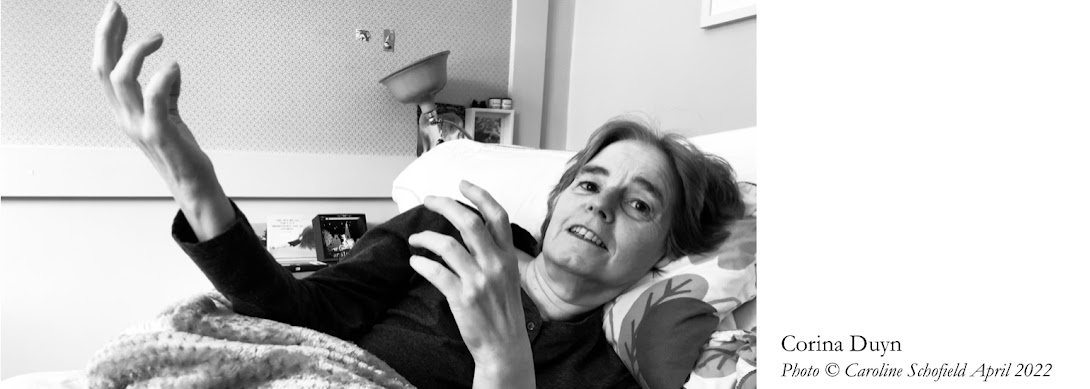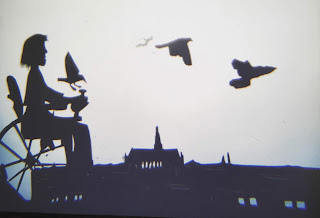Living in the shadows of an Invisible Octopus
Working on ‘Invisible Octopus’ inexplicably forced me to examine and establish
the truth about what is my normal.
During the past five months I have been working with Dr. Emma Fisher through a mentoring bursary from the Arts & Disability Ireland Connect Scheme. The aim was to write a script for my existing puppets, as well as explore alternative forms of puppetry to accommodate the physical challenges due to my chronic illness/disability M.E..
In this paper, which I am sharing in sections, I explore the background to ‘Invisible Octopus’ and the challenges, opportunities and personal revelations it brought.
Previous posts
 |
| Octopus on my shoulder |
The following reflection follows on from the post "M.E. as Invisible Octopus" in which I introduce Octopus and write about being taken into hospital.
During my hospital admission, the not knowing
if I could return to my own home and remain living independently was a daily
thought.
After three weeks a temporary extended home care package was put in place. On discharge I was not sure if I was actually able to
be at home. The last nurse I spoke to was worried I would be back in hospital later that week. It was a gamble. My reasoning was that I would only know how well I would function by actually
being home.
In spite of its function as a reservoir for human darkness -
or perhaps because of it- the shadow is the seat of creativity...
(Jungian psychology)
Finding my way back
Yet again I had to
find my way within this illness. It’s all a continual learning process, including accepting strangers into my home, into my personal energy field. There was
nowhere to escape to. All I had were my
thoughts and the birds outside my window. But as Maya Angelou so
poignantly wrote: … the caged bird sings of freedom...
 |
| House Sparrow |
I had to find peace in my solitude. I am aware I am just one person in
this worldwide community of hermits, of people living with invisible illnesses
hidden behind their walls, locked in their thoughts. Yet, this emptiness, when
ready for it, is also a space to breathe.
 |
| The Girl - home in her hospital bed |
This experience
brought me back to my creative mind and ultimately to my puppets,
and back again to the reality that I had to find new ways to create, to
evaluate and to find value in my existence. I
realized that I could no longer work with my puppets, but maybe I could write a
script for a film?
Being in touch with Dr. Emma Fisher brought me
to a point where I decided to apply for a mentoring bursary from
Arts & Disability Ireland. I learned a whole lot more than just how to
write a script. As I wrote in previous posts, I came face-to-face, ‘puppet-to-face’, with my
reality.
At times I was so engrossed in the project that many nights, at the
edge of sleep, I would think of another line for my poem, or another aspect of
my journey to explore. A wonderful time spent locked away in my
creative mind, a learning, healing and therapeutic experience.
At the same
time, I am aware that it is easier to think about props and set design than
to focus yet again on new health issues. Working on Invisible
Octopus was escapism at best. However, being so involved in the project was
physically too much. I had to concede and take a big step back.
The other side of the creative process
 |
| A drive down the ramp... Octopus came along... |
Working on the
props was manageable to a degree, as I could
stop after ten- or twenty-minutes work. Filming however was a lot more energy
consuming than I had anticipated. The two very short clips we
explored - me leaving the house with ‘Octopus’ on my shoulder, and the garden
scene with ‘The Girl’ in her chair with ‘Octopus’ invading her space - brought
on relapses and put me into bed for days/weeks.
 |
| Filming 'Octopus' by Lorraine, Marwa and Aram |
The filming was done by Aram, with assistance of Marwa and Lorraine. I was there too, obviously, but did not take part in any physical way. Yet it was too intense and too much of an onslaught on my limited energy.
I had to
rethink the project and put a much longer
timescale on completing it. This also means that filming
in my beloved garden has to wait till spring. This possibly changes the story
again…
Hanging on by a string
There are many very short segments of film recorded. I realized I had (still have) great difficulty looking at them. My brain can not comprehend a sequence of short clips of a few seconds each.
This of course would make it difficult to edit the proposed film. I had not anticipated this added complication, courtesy of my illness. After months I put the short clips together, one after the other, unedited. That was the first time I could actually watch the footage.
 |
| Under my beloved tree, among the birds |
It brought a sense of unease. The imagery is immensely powerful, but something wasn't right. In order to get the puppet most in view, she was moved from under her beloved tree. Cinematic this made perfect sense. The imagery is amazing. Powerful. Stunning. The puppet took her rightful place and was not part of the background. But I, the puppet, I felt was no longer one with nature. Although the puppet was still near the tree, a meter away from the base, it changed the story.
 |
| The reality of Octopus... |
I realized that the tree in my garden holds a huge significance for me. I sit under it. And lie under it. It is full of bird feeders. Full of birds. I see them from my recliner in the livingroom and from my bed. My life revolves around my garden, the tree and the birds...
Wow. That was a very strong emotion to deal with.
 |
| shadow puppetry with tree and birds in my garden |
I am aware that in editing we can possibly mix both the scenes of ‘The Girl’ under the tree among the birds, and the closeups of ‘Octopus’, so powerfully filmed. I also realized that when others animate my puppets, the story changes. It brought inner conflict. It made me think back about a question posted by Puppeteer Chris (Facebook, 26 March 2019):
“Is it OK for me as a white male puppeteer to represent (through my
craft) people of old age, colour, other-wise gendered, or differently able?
These people are severely under-represented in our artform so should
I refuse such roles?”
Some of the answers: L.P: “… I think it depends how
you represent people as well as who you are yourself…" K. B: “… not who you
represent, it's how…”
At the time I thought it would be wonderful if able-bodied puppeteers could animate my puppets, as it was beyond my ability. This still holds true, but I realize that as a disabled puppet maker I need to be very clear when explaining to the animator about what story I want to portray. I would also need to be accepting of how other people’s energy enters my puppets.
Puppets move via the breath and energy of the puppeteer. This knowledge became so apparent during those two short filming sessions. But I also became very aware of my own ability, and disability. And how my immediate environment plays such a big role in my life, dealing with illness and the creative process.
So much learning...















